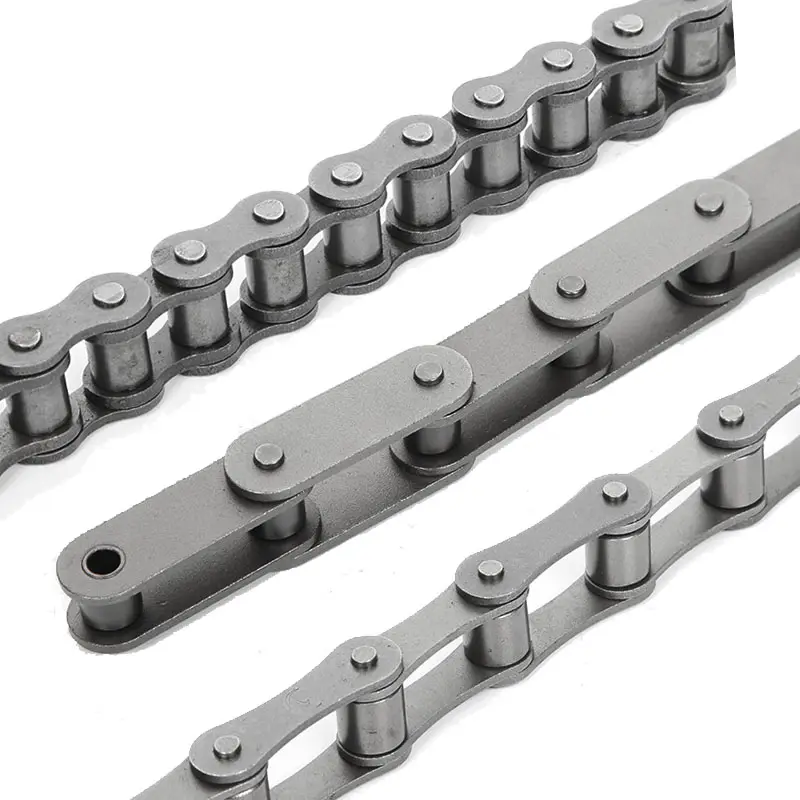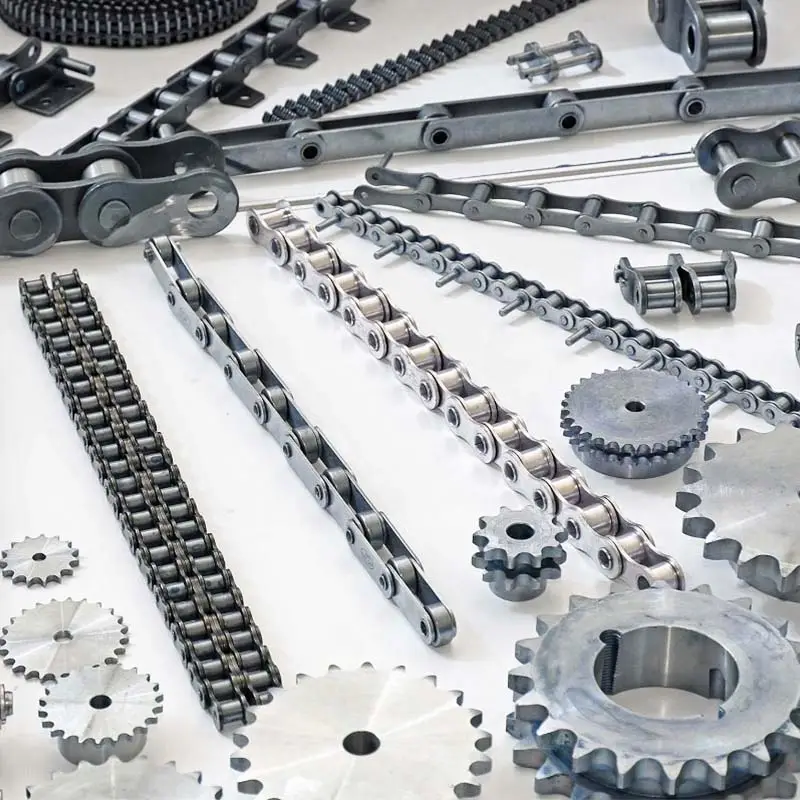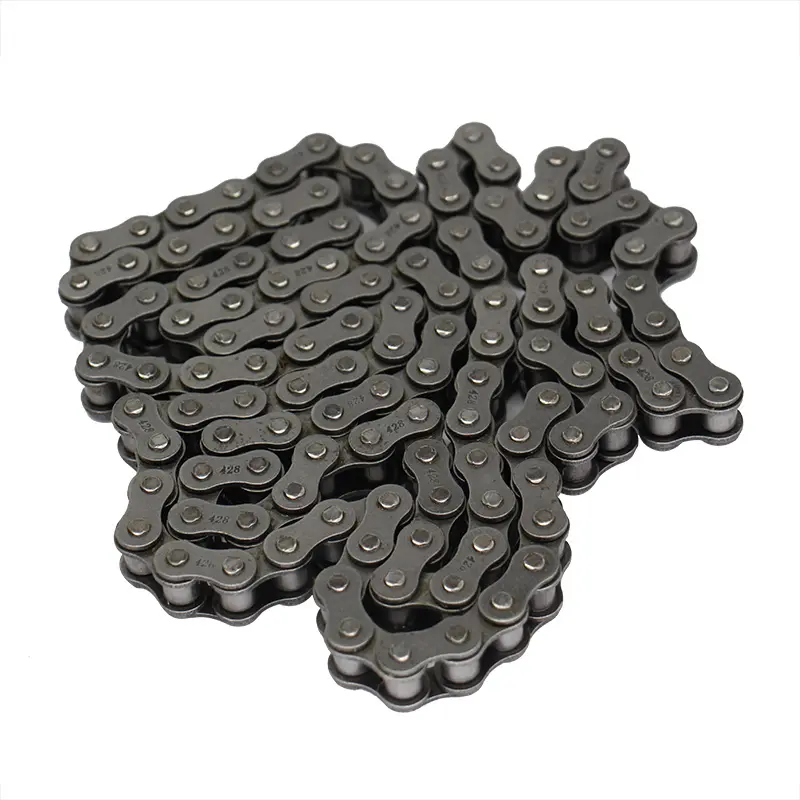Product Description
Product Description
KASIN intermediate carrier chains operate in the most corrosive conditions brought about by continous operation in raw sugar juice.As a consquence chains employ corrosion resistant materials . The swivel attachments allows for self allignment of the strands during operation compensating for anymismatch.
Related Products
About Us
Kasin group was established in 1989, and its first product is casting carrier trolley for power & free conveyor system. In 1995, CHINAMFG purchased HangZhou Guoping Forging Factory (LYGP), a marketer of forging bolts & nuts to power & free line market in china. With this acquisition, CHINAMFG positioned itself as 1 of major parts suppliers of monorail and power & free conveyor system in china.
In 2
| Material: | Alloy |
|---|---|
| Structure: | Roller Chain |
| Surface Treatment: | Polishing |
| Feature: | Fire Resistant, Oil Resistant, Heat Resistant |
| Link Plate Height: | 38.50 mm |
| Pin Length: | 81.70mm |
| Samples: |
US$ 100/Meter
1 Meter(Min.Order) | |
|---|
| Customization: |
Available
| Customized Request |
|---|

How do engineering chains compare to other types of chains in terms of efficiency?
Engineering chains are known for their high efficiency in power transmission compared to some other types of chains. Their efficiency can be attributed to several factors:
- Minimal Friction: Engineering chains are designed with precision rollers and bushings, which reduces friction between the chain’s components. This results in less energy loss during power transmission.
- High-Quality Materials: These chains are typically made from high-quality materials, such as alloy steel, which ensures durability and minimal elongation under heavy loads. This material choice helps maintain efficiency over extended periods of use.
- Precise Manufacturing: Engineering chains are manufactured with tight tolerances and precise engineering, ensuring consistent performance and smooth operation. This precision minimizes energy losses due to chain misalignment or uneven loading.
- Optimized Design: The design of engineering chains takes into account the specific requirements of power transmission, making them well-suited for their intended applications. This optimized design contributes to their overall efficiency.
- Proper Lubrication: Regular and proper lubrication of engineering chains is essential to maintain their efficiency. Adequate lubrication reduces friction and wear, optimizing power transfer efficiency.
Compared to some other types of chains, such as standard roller chains, engineering chains may offer higher efficiency due to their advanced design and manufacturing processes. However, the choice of chain type depends on the specific application requirements, load conditions, operating environment, and other factors.
In certain applications, other power transmission methods like belts or gears might be preferred over chains, based on factors such as noise level, space constraints, and maintenance considerations. Each power transmission method has its advantages and limitations, and selecting the most suitable option requires careful consideration of the application’s needs.

What are the environmental considerations when using engineering chains?
When using engineering chains in various applications, there are several environmental considerations to keep in mind to ensure optimal performance, longevity, and safety. These considerations include:
1. Temperature: Extreme temperatures, whether high or low, can affect the performance and lifespan of engineering chains. Proper lubrication and material selection are essential to ensure the chain can withstand the temperature conditions in the operating environment.
2. Corrosive Environments: In corrosive environments, such as those with exposure to chemicals, saltwater, or other corrosive substances, it’s crucial to choose engineering chains made from corrosion-resistant materials, such as stainless steel or coatings that provide protection against corrosion.
3. Dust and Contaminants: Dust, dirt, and other contaminants can accumulate on the chain, leading to increased wear and reduced efficiency. Regular cleaning and proper chain guarding can help minimize the impact of these environmental factors.
4. Moisture and Water Exposure: For applications exposed to moisture or water, selecting chains with appropriate sealing or corrosion-resistant coatings is important to prevent rust and maintain performance.
5. UV Exposure: Outdoor applications exposed to direct sunlight can be subject to UV degradation. Using engineering chains with UV-resistant materials or protective coatings can help mitigate the effects of UV exposure.
6. Noise and Vibration: Certain environments may have strict noise regulations. In such cases, using chain guides, dampers, or other noise-reducing features can help lower the noise and vibration levels produced by the chain.
7. Load Variation: Environmental conditions may lead to variations in the load on the chain. Understanding and accommodating load variations is crucial for ensuring the chain’s reliability and preventing premature failure.
8. Compliance with Regulations: Some industries have specific environmental regulations that must be adhered to. It’s essential to select engineering chains that comply with these regulations to maintain a safe and environmentally friendly operation.
9. Maintenance and Lubrication: Proper and regular maintenance, including lubrication, is critical to ensure the chain’s smooth operation and extend its service life in any environment.
Considering these environmental factors will help in selecting the right engineering chain for a particular application, ensuring optimal performance, and reducing the risk of chain failure due to environmental conditions.

Can engineering chains be used in corrosive or harsh environments?
Yes, engineering chains can be designed and manufactured to withstand corrosive or harsh environments. When operating in such conditions, it is crucial to select the appropriate materials and coatings for the chain to ensure its durability and performance. Here are some considerations for using engineering chains in corrosive or harsh environments:
1. Material Selection: Choose materials that have high corrosion resistance, such as stainless steel or nickel-plated chains. These materials can withstand exposure to moisture, chemicals, and other corrosive agents.
2. Coatings and Surface Treatments: Applying specialized coatings or surface treatments to the chain can further enhance its corrosion resistance. Common coatings include zinc plating, chromate conversion coating, and polymer coatings.
3. Sealed Joints: Opt for engineering chains with sealed joints or special seals to protect the internal components from contaminants and moisture, reducing the risk of corrosion.
4. Environmental Ratings: Some engineering chains may come with specific environmental ratings that indicate their suitability for certain conditions. Check these ratings to ensure the chain is appropriate for the intended environment.
5. Regular Maintenance: Even with corrosion-resistant materials and coatings, regular maintenance is essential. Keep the chain clean, lubricated, and free from debris to prevent corrosion and premature wear.
6. Compatibility with Other Components: Ensure that all components in the chain system, such as sprockets and bearings, are also suitable for use in corrosive environments.
7. Temperature Considerations: Take into account the operating temperature range of the environment. Some materials may perform differently at extreme temperatures, affecting the chain’s overall performance.
8. Chemical Exposure: If the chain will be exposed to specific chemicals or substances, verify that the chosen materials and coatings are resistant to those chemicals.
By carefully selecting the right materials, coatings, and design features, engineering chains can effectively handle corrosive or harsh environments, maintaining their functionality and longevity in challenging industrial applications.


editor by CX 2023-10-21